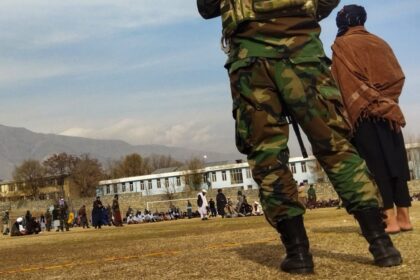RASC News Agency: Richard Bennett, the United Nations Special Rapporteur on the human rights situation in Afghanistan, has voiced grave concern over the Taliban regime’s escalating use of corporal punishment particularly public flogging warning that such practices not only violate international human rights law but also underscore the dangers of legitimizing a regime rooted in systemic brutality. According to verified reports, the Taliban’s judiciary sentenced over 60 individuals, including at least four women, to public flogging across various provinces in just the past week alone. The charges ranged from extramarital relationships, theft, and drug trafficking to the sale of alcohol crimes for which sentences were carried out under a legal system that provides no transparency, due process, or judicial safeguards.
In one recent case from Badakhshan province, the Taliban’s Supreme Court announced the flogging of a man accused of selling alcohol a punishment that drew renewed condemnation from international observers. Richard Bennett responded to these reports on the social media platform X on June 2, stating: “In 2025, we are witnessing a troubling surge in corporal punishments under Taliban rule. These acts must be halted immediately. The world must resist all attempts to normalize this regime. No Afghanistani refugee should be forcibly returned to such a state.”
Bennett’s remarks echo the growing alarm among human rights organizations and legal experts, who warn that public punishments carried out in town squares and stadiums are not merely punitive but performative acts of repression, intended to instill fear, assert dominance, and suppress dissent among an already traumatized population. Under the Taliban’s rule, Afghanistan has reverted to a draconian legal structure based on a rigid and often arbitrary interpretation of Sharia law. In this system, judicial transparency is nonexistent, legal representation is absent, and women are systematically excluded from all aspects of the judiciary. Trials are often conducted in secret, sentences are handed down without evidence, and punishments are enforced with brutal efficiency.
The Taliban’s so-called “judiciary” has become a mechanism for public control rather than justice weaponized to reinforce patriarchal dominance, stifle resistance, and signal that no one is beyond the reach of state violence. Women, ethnic minorities, and the poor disproportionately bear the brunt of this terror-based governance model. What is particularly disturbing, say critics, is the international community’s failure to take meaningful action in the face of such gross violations. While some foreign donors and UN agencies continue limited engagement with Taliban-controlled institutions under the banner of humanitarian neutrality, the continued absence of accountability emboldens the group to intensify its abuses with impunity.
Bennett also emphasized that the international community has a legal and moral obligation to protect those fleeing Taliban persecution. “Any forced repatriation of Afghanistani refugees is tantamount to complicity in abuse,” he noted. The surge in flogging sentences follows broader patterns of Taliban repression from the banning of girls’ education beyond grade six, the exclusion of women from public life, to the dismantling of civil society and the media. Every act of public punishment, every silencing of a dissenting voice, contributes to what UN experts have increasingly described as a gender apartheid regime and an institutionalized system of violence.
As Bennett and other rights defenders warn, normalizing the Taliban is not diplomacy it is acquiescence to tyranny. Without global pressure, the Taliban’s reign of punishment will continue to expand unchecked, with the bodies of ordinary Afghanistanis paying the price for the world’s silence.






